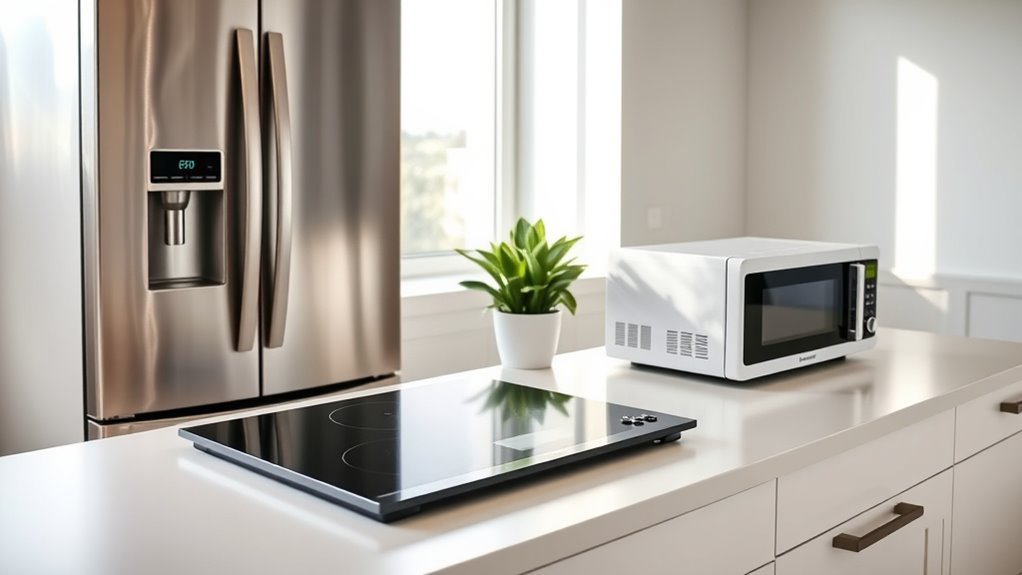Choosing energy-efficient appliances helps you lower your energy bills, reduce environmental impact, and build a smarter home. Modern appliances use advanced features like inverter motors, sensors, and smart systems to operate at peak efficiency while maintaining high performance. Pairing these appliances with renewable energy sources like solar panels makes your home even greener. Staying informed about the latest innovations ensures you select products that save money and support sustainability. Discover more ways to create an eco-friendly living space.
Key Takeaways
- Look for appliances with high Energy Star ratings for proven energy efficiency and environmental benefits.
- Choose models with inverter motors, variable speed compressors, and advanced sensors to minimize energy waste.
- Integrate smart home systems for real-time energy monitoring and automated energy-saving adjustments.
- Pair appliances with renewable energy sources like solar panels to further reduce carbon footprint.
- Prioritize durable, innovative appliances that support sustainable living and long-term cost savings.

Have you ever wondered how much energy your daily appliances consume and how you can reduce that? If so, you’re not alone. Many homeowners want to lower their energy bills and lessen their environmental impact, but figuring out where to start can be overwhelming. The good news is that choosing energy-efficient appliances is a straightforward way to make a significant difference. These appliances are designed with cutting-edge appliance innovation**, allowing them to perform just as well—if not better—while using less power. As technology advances, manufacturers are integrating smarter features, such as sensors that adjust energy use based on your habits, making your home more sustainable without sacrificing convenience. This push toward appliance innovation is also aligned with the broader shift toward renewable energy sources**, which aim to generate power more sustainably and reduce reliance on fossil fuels. When you opt for energy-efficient devices, you’re not just saving money; you’re supporting a shift to cleaner energy options, which benefits everyone.
The key to maximizing savings and environmental benefits lies in understanding how these appliances work. Modern refrigerators, washers, and HVAC systems incorporate inverter motors, variable speed compressors, and other innovations that maximize energy use. These features allow appliances to operate at the precise level needed, avoiding unnecessary energy waste. For example, energy-efficient refrigerators maintain ideal temperatures using less power, thanks to better insulation and smarter thermostats. Similarly, advanced washing machines use less water and electricity by adjusting their cycle lengths based on load size, thanks to built-in sensors. Additionally, the rising awareness of divorce statistics and the importance of legal representation emphasizes how staying informed and making strategic choices can lead to better outcomes, whether in personal or household decisions. When you choose these appliances, you’re embracing appliance innovation that pushes the boundaries of efficiency, making your home smarter and greener. Incorporating energy-efficient technology is also a wise decision, as it often leads to longer-lasting appliances and reduced maintenance costs over time. Furthermore, integrating smart home systems can enhance your ability to monitor and optimize energy consumption effortlessly. Using advanced technological features can further improve your home’s efficiency and reduce waste. Staying current with emerging appliance innovations can help you select the best devices that combine efficiency with durability.
Another aspect to contemplate is how your energy choices fit into a larger renewable energy strategy. While energy-efficient appliances help reduce overall consumption, pairing them with solar panels or wind turbines can further diminish your carbon footprint. This combination creates a home environment powered by renewable energy, making your efforts even more impactful. As the grid increasingly incorporates renewable sources, your investment in energy-efficient appliances becomes a crucial part of a sustainable lifestyle. It’s a proactive way to decrease reliance on non-renewable resources and contribute to a healthier planet. Ultimately, selecting energy-efficient appliances is about more than just individual savings; it’s about supporting innovation and renewable energy initiatives that pave the way for a cleaner, more sustainable future.
Frequently Asked Questions
How Do I Verify an Appliance’S Energy Efficiency Rating?
To verify an appliance’s energy efficiency rating, look for energy efficiency labels on the product. These labels provide clear information about its energy consumption and performance. You can also check for certification programs like ENERGY STAR, which indicate the appliance meets strict energy-saving standards. Research online or visit manufacturer websites to confirm the ratings. This way, you guarantee you’re choosing a more environmentally friendly and cost-effective appliance.
Are Energy-Efficient Appliances More Durable Than Standard Models?
They say “you get what you pay for,” and that’s true with appliances too. Energy-efficient models often have comparable or even better durability, thanks to quality materials and advanced engineering. Factors like proper maintenance and brand reputation influence appliance lifespan. So, don’t assume energy efficiency equals less durability—look at durability factors and choose reputable brands for lasting performance. You might find these appliances serve you well for years to come.
What Is the Typical Payback Period for Energy-Efficient Appliances?
The typical payback period for energy-efficient appliances usually ranges from 1 to 5 years. During this time, you’ll notice significant cost savings on your energy bills, which helps offset the initial investment. Plus, by choosing these appliances, you reduce your environmental impact, contributing to a greener future. After the payback period, you’ll continue enjoying lower utility costs and a positive effect on the environment.
Can Smart Technology Improve Energy Savings in Appliances?
Smart technology can definitely improve energy savings in appliances. By integrating a smart home system, you can optimize usage and monitor energy consumption through energy monitoring features. This way, you’re alerted to waste and can adjust settings remotely, which helps reduce costs and environmental impact. Overall, smart appliances make it easier for you to control and conserve energy, making your home more efficient and eco-friendly.
Do Government Incentives Apply to All Types of Home Electronics?
Oh, the joy of government incentives—like renewable subsidies—are they equally available for all home electronics? Sadly, no. You won’t find a magic spell that makes every device eligible. Appliance eligibility varies wildly, and some gadgets still miss out. So, before splurging on that fancy smart fridge, check if it qualifies for these perks. Otherwise, you’re just throwing money into a black hole of eligibility uncertainty.
Conclusion
By choosing energy-efficient appliances, you not only save money but also help protect the environment. It’s tempting to believe that small changes don’t make a difference, but studies show that widespread use of greener electronics can substantially reduce energy consumption and emissions. So, next time you shop, consider if that appliance is truly eco-friendly. Your simple decision could contribute to a healthier planet—proving that even small actions, when multiplied, create big change.









